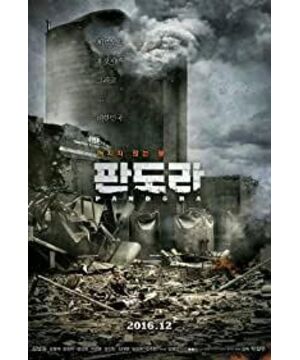Disaster films, as a film type with strong recognition and attractiveness in South Korea, have always been sought after by Korean directors. "Train to Busan" and "Tunnel", which were hit by the fire last year, are both excellent works with actors' acting skills and script plots being online at the same time. Korean directors have also explored a mature disaster film shooting mode. However, different directors' in-depth interpretation of similar themes gradually tends to be the same. The theme of the film is nothing more than criticizing the government's inaction in dealing with social problems and its incompetence in dealing with major accidents, and the means of expression are through personal heroism. The protagonist, to contrast the darkness of the government. Although "Pandora" is not as influential as "Train to Busan", and it does not deviate from the old way of satirizing the government in terms of structure, it boldly adopts anti-personal heroism to shape characters, breaking the inherent model of disaster films to a certain extent. It brings new possibilities to such films with serious homogenization.
The story takes place in a small village in southern South Korea that uses nuclear power plants as its industry. Most of the residents do boring jobs in the power plant. The protagonist, Jae Hyeok, is reluctant to live this kind of life, dreaming of being able to escape from the town one day, but after failing in business, he can only come back and work at the power station while eating and waiting to die. Such a decadent appearance makes people wonder how he can become the hero who saves the world in disaster films. Sure enough, when the accident first happened, Zai He's first thought was to escape. His father and eldest brother died because of the nuclear power plant accident, so he knew the danger of radiation and just wanted to save his own life. However, the company executives closed the gate of the power station and forced the workers to go back to deal with the accident. When the crowd was in chaos, the reactor exploded. Jae-hyuk, who woke up from the rubble, was also exposed to radiation in order to rescue the injured worker. After that, they had already escaped, and learned that someone needed to risk their lives to enter the nuclear power plant to repair the loophole, otherwise the whole of Korea would face extinction. . As the staff of the power station, everyone voluntarily entered the emergency repair, and the sudden danger required one person to stay. In order to save his family, Jae-hye chose to sacrifice himself and detonated together with the explosives to save the power station.
As a typical heroic plot, this film deliberately weakens the heroic temperament of the protagonist, and on the contrary magnifies the cowardly and timid side of him. From the very beginning, Jae-hee was very disgusted with the nuclear power plant itself. The death of his relatives and the hopelessness of life made him instinctively want to run away when the accident happened. When the president delivered a national speech, imploring volunteers to enter the power station, Jae-hyuk was also the first to stand up against it. He was unwilling to sacrifice his life for these officials. If it wasn't for their incompetence, the disaster could have been avoided. In the end, what made Jae-hyuk change his mind was not the belief in the supremacy of national interests, nor the honor of being a hero to be remembered, just to prevent his loved ones from being endangered again. Just like how he tried desperately to save his co-workers from the rubble again and again, he didn't know how valuable the nuclear power plant behind him was, but to him it was not as valuable as his friends. The lives of 50 million people in South Korea were not unimportant, but in The safety of his relatives was not important to him. In He let us see, is an ordinary person with flesh and blood, not the image of an omnipotent and indestructible hero. How many times the audience has become accustomed to accepting that the protagonist changed the ending of the story with a halo, and then survived unscathed. Such a "realistic" plot has brought the somewhat deviated disaster movie back to the right track, and the audience is not blindly. Thrills come from heroism.
On the contrary, the old problems of Korean movies are also reflected in "Pandora". In recent years, Korean gangster films seem to have embarked on a path of "fighting against the government to the end". "New World", "Asura" and "King" are more bloody and violent, and they are no longer satisfied with exposing the dark side of the government. , but the naked display of filth. Even disaster films have been influenced by such models, spared no effort in satirizing the government's incompetence, this time targeting the president. Not to mention whether the Korean political world is really as shown in the movie, first of all, when the screenwriters deliberately pursue dramatic tension, they often seem to exert too much force, portraying officials as stupid images with only personal interests in their eyes. In "Pandora", the young president was swindled by the wily prime minister without knowing it. The prime minister concealed the loopholes in the nuclear power plant beforehand, and then repeatedly obstructed the president from knowing the truth. I am afraid that he is coveting the throne of the president. But it is hard to believe that this is the practice of a prime minister of a country when he still has his own calculations when the country survives and perishes. When the waste of the nuclear power plant was about to be leaked, there were high-level officials who prevented the fire brigade from rescue, on the grounds that the nuclear power plant would be scrapped if it was watered, and who would be responsible for the loss. I really don't know if they plan to keep the power station that has exploded for use, or wait to see all the Koreans finish playing. This kind of mentally retarded plot that lacks basic rationality is difficult to add highlights to the film, but it makes people feel a little ridiculous. After nearly 20 years of vigorous development, Korean films have occupied a place in the Asian and even world film circles, and have also formed their own unique style. However, this style seems to be left with endless criticism and criticism of the government. The increasing frequency of Busan's swearing dialect, this ostensible formalism. Seeking breakthroughs in ideas within the existing framework may be the top priority for Korean films.
View more about Pandora reviews











